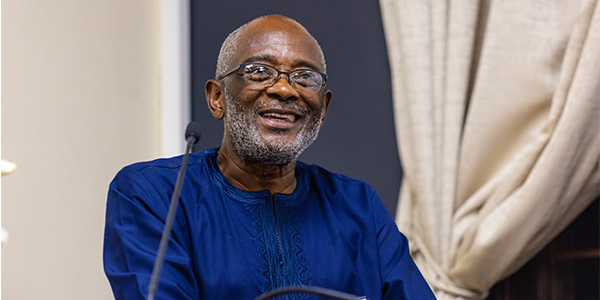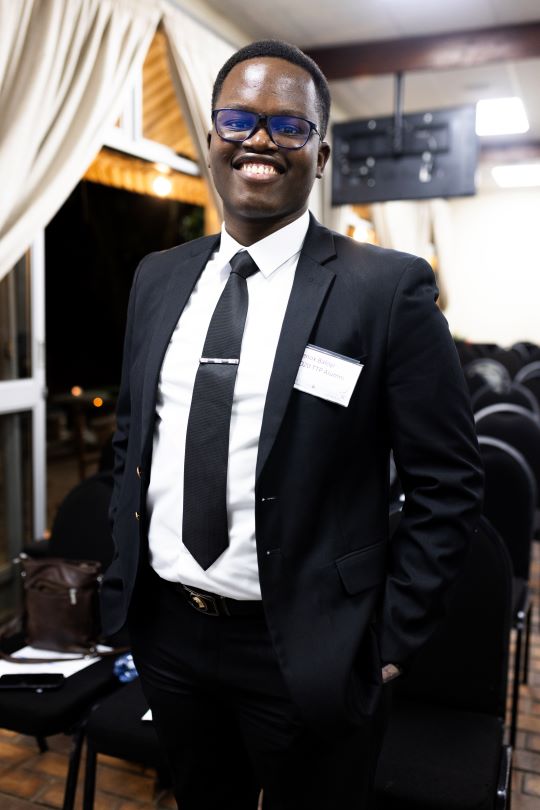Final curtain call for Targeting Talent Programme
- Wits University
The Programme celebrates a remarkable 16 years of excellence.

After 16 years of outstanding mentorship and learner support, the transformative Targeting Talent Programme (TTP) bowed out with a sensational record on academic and psychosocial support for learners.
Alumni and staff gathered to celebrate and reflect on TTP’s success as well as to honour Professor Loyiso Nongxa, credited as the vision behind TTP. He conceptualised, helped to establish, and supported the programme from inception to date.
Nongxa’s dream for TTP was informed by his childhood when South African education had been a separatist system that undermined the talent of black and African learners by robbing them of opportunities.
“All of us are born with a talent that is latent within us, that should be provided an environment in which to blossom” said Nongxa. “Irrespective of someone’s socioeconomic background, people can succeed if given the opportunity.”
Targeting Talent set out to empower learners from disadvantaged communities by giving them the opportunity to not only dream about accessing tertiary education, but to equip them with the skills to thrive in university and life.
Over the past 16 years, the programme graduated 3 493 students from disadvantaged backgrounds who have gone on to be exceptional in their respective careers. TTP identified high school learners with strong academic potential from disadvantaged communities across the country, nurtured and supported them throughout their Senior Phase of high school (Grades 10 to 12), focusing on mathematics, sciences, social sciences, and finance clusters of subjects.
The two-week residential enrichment programme took place annually from 2007 to 2023. The holistic programme included teacher support workshops as well as community involvement to support the success of the learners.
“I am proud to say I am a product of TTP,” said Lenox Baloyi. “Where I am today, what I studied, what I have achieved, is because of this programme. Thanks to TTP, I managed to step out of my shell and overcome my victim mentality.”
Baloyi is a TTP alumnus who joined the programme in 2018 as a shy young man from an under- resourced school in rural Limpopo. Today he holds a double major in Computer Science and Finance from Wits University and works as an investment banker.

The programme boasts a 94% access rate to university since it was established. TTP learners accessed the top universities in South Africa in either their first or second choice programme. "We would like to send our deepest gratitude to our funders without who none of this would have been possible", said Zena Richards Director of 足球竞彩app排名 Equity and Talent Management Unit (SETMU) at Wits.
A special thank you to our funders
The TTP was successfully launched in 2007, with a cohort of 267 grade 10 learners and 46 of their educators. The learners and educators were from 41 schools across three provinces, namely Gauteng, Limpopo, and Mpumalanga, funded by Goldman Sachs and the Telkom Foundation.
For the 2010 intake, the TTP was jointly funded by Beyond Petroleum South Africa (Pty) (BP SA) and the South African National Roads Agency (Pty) (SANRAL) for the period 2010–2012. A total of 191 learners from three provinces, namely Gauteng, Limpopo, and Mpumalanga, completed the programme.
During the same period, 94 learners funded by the Limpopo Department of Education successfully completed the programme. The cohort of learners were from Limpopo Province.
The Department of Science and Technology (DST) commenced their funding period from 2011 to 2016; DST funded 830 learners in the programme. The cohorts of learners were from all the nine provinces in South Africa.
In 2013, the BP South Africa Education Foundation Trust (BPSAEFT) independently funded learners from 2013 to 2022. BPSAEFT has funded 1328 learners, having completed their funding cycle in October 2020. Funded learners were from three provinces, namely Gauteng, Limpopo, and Mpumalanga.
The Industrial Development Corporation (IDC) commenced their funding for the TTP in 2011 with 21 learners from Limpopo. In 2015, the IDC re-invested in the programme and funded 47 learners from eight provinces. The cohorts of learners were from all provinces in South Africa except the Western Cape.
SANRAL independently funded a cohort of 49 learners from 2013 to 2015. The 49 learners were from three provinces, namely Gauteng, Limpopo, and Mpumalanga.
In 2016, the Manufacturing, Engineering, and Related SETA (merSETA) funded 23 learners, who completed the programme in June 2018. The 23 learners were from three provinces, namely Gauteng, and Limpopo.
In 2017, PRIMEDIA and Standard Bank funded 17 and 47 learners, respectively. These learners completed the programme in June 2019. These learners were from Gauteng, Mpumalanga, the Free State, and the North West provinces.
In 2018, the African Explosives and Chemical Industries (AECI) funded nine learners. These learners completed the programme in October 2020. The funded learners were from the Northern Cape and Mpumalanga.
In 2019, the Education, Training, and Development Practices (ETDP) funded 99 learners. These learners completed the programme in August 2021. In 2021 and 2022, the ETDP SETA reinvested to fund a further 80 learners. Thus far, the ETDP SETA has funded 257 learners since 2019. Their funding cycle ends in 2023. The cohorts of learners were/are from Limpopo Province.
In 2021, Assmang and Boleng started their funding cycle and funded 50 learners. They reinvested to fund a further ten learners. Thus far, the Assmang-Boleng Trust has funded 60 learners. Their funding cycle ends in 2023. The cohort of learners are from the Northern Cape province.
In 2021, Cell C funded 60 learners. They reinvested to fund a further 14 learners. Thus far, Cell C has funded 74 learners since 2021. Their funding cycle ends in 2023. The cohorts of learners are from all provinces in South Africa except the East.

